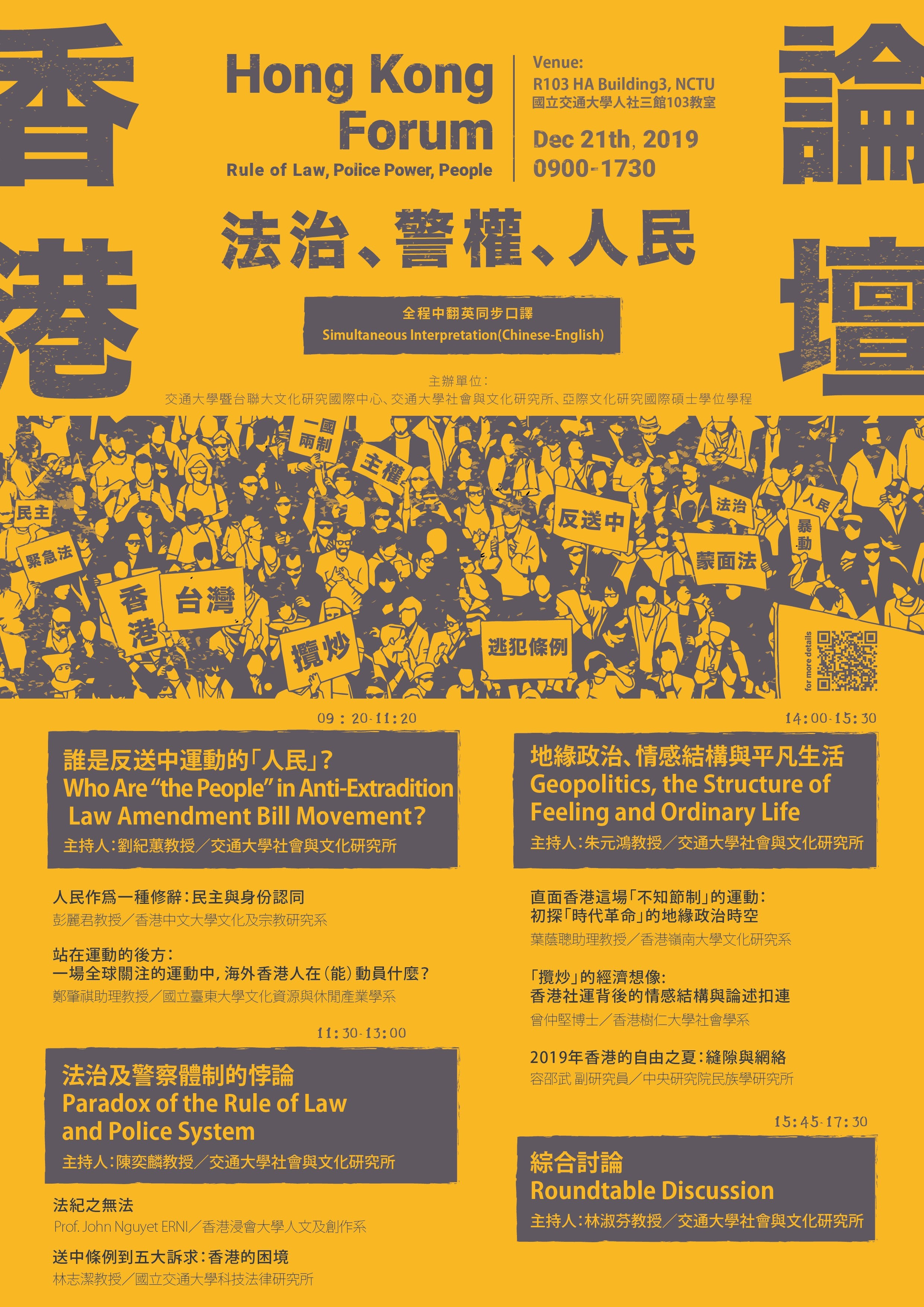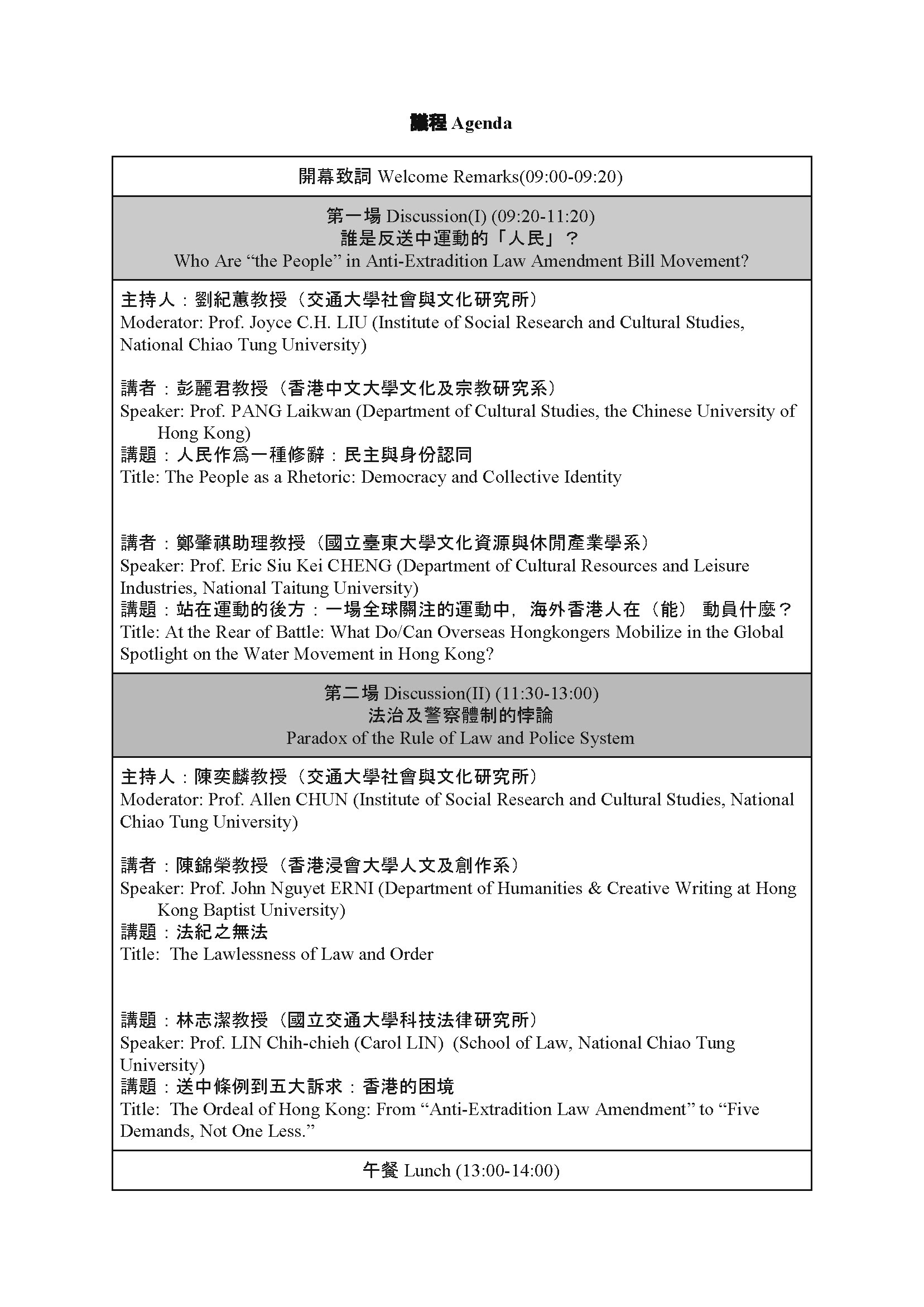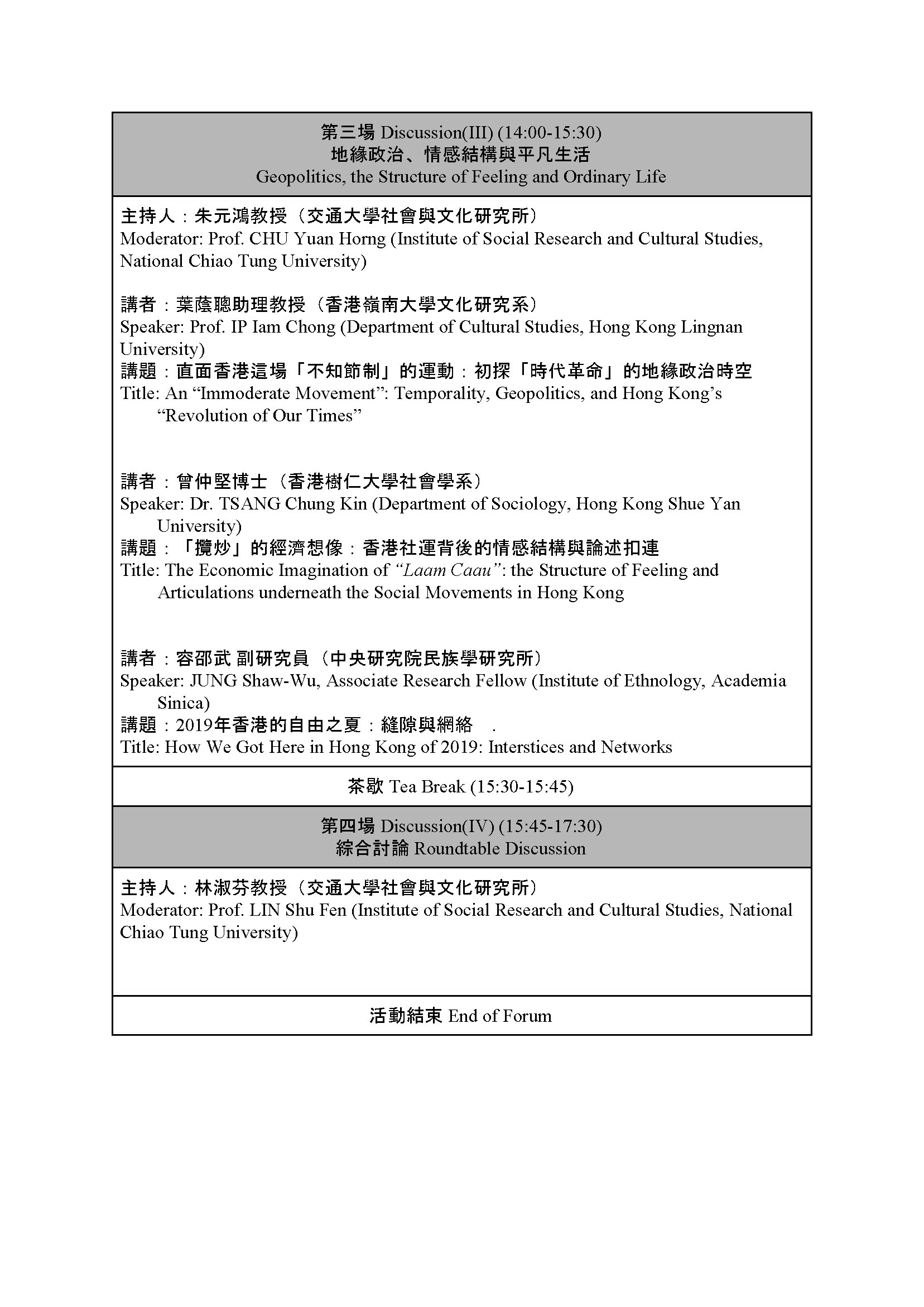香港論壇:法治、警權、人民 Hong Kong Forum: Rule of Law, Police Power, People

香港論壇:法治、警權、人民
Hong Kong Forum: Rule of Law, Police Power, People
日期:2019/12/21(六)
時間:9:00 - 17:30
地點:國立交通大學光復校區人社三館103教室
主辦單位:國立交通大學文化研究國際中心、
活動詳情:https://www.facebook.com/
**全程中翻英同步口譯
Date: December 21, 2019 (Sat)
Time: 9:00-17:30
Venue: R103 HA Building 3, National Chiao Tung University
Organiser:
International Center for Cultural Studies (ICCS_NCTU),
Institute of Social Research and Cultural Studies (SRCS_NCTU),
International Master’s Program in Inter-Asia Cultural Studies (IACS_UST)
For more details: https://www.facebook.
Forum Agenda attached
**Simultaneous Interpretation(Chinese-
簡介
自今年(2019)3月15日起,至6月9日大規模爆發的反對《
是次活動的首個關鍵詞是「法治」。運動最初由《
第二個關鍵詞為「警權」。蒙面而高度武裝的執法部隊,
第三個關鍵詞是「人民」。反送中運動經常以「香港人」
這次運動被視為1967年六七暴動以來最大規模的社會運動,
本論壇邀請香港學者以及台灣學者,針對下列議題,共同討論,
議程 Agenda
=============
About
Started from March 2019, and further fueled by the protest on June 9, Anti-Extradition Law Amendment Bill Movement (Anti-ELAB Movement) has swept Hong Kong for eight months and protests in Hong Kong still show no sign of subsiding. Notwithstanding the withdrawal of the bill, the firing of multiple rounds of tear gas has shaken the legitimacy of rule of law and police authority in Hong Kong.
The first keyword of our forum is “rule of law”. The movement was triggered by the Fugitive Offenders and Mutual Legal Assistance in Criminal Matters Legislation (Amendment) Bill 2019, also known as the extradition bill. Subsequently more and more protests and rallies failed to obtain letters of no objection from the Hong Kong police, engendering public debate on the Public Order Ordinance. In October, the Hong Kong government invoked the Emergency Regulations Ordinance, a colonial-era relic, to forbid the use of face masks; the emergency law was then ruled unconstitutional by the High Court in November and aroused a fierce objection from both National People’s Congress Standing Committee in China and Hong Kong government. Legal issues have been the recurring flashpoints throughout the crisis. As an entrenched core value in Hong Kong, rule of law also works as a divergence from rule by law in China. To Hong Kong people, what does an illegitimate legal system imply? How does such illegitimacy radicalize the actions of protestors? What are the explicit details and loopholes of these laws and the legal institution? How does Taiwan view the issues arising from the extradition bill?
The second keyword is “police power.” Masked and armed force exercises their authorities anonymously in the city. Cases of abuse of power have been reported—marching into private areas like residences and university campuses without a warrant, calling demonstrators “cockroaches”, and firing tens of thousands of rounds of war-banned CS gas accompanied with the “composition undisclosed” blue liquid from water cannons to civilians. Thousands of citizens including reporters, social workers, and first-aid workers have been arrested. Among them many were injured from deadly use of police baton and gunshot, and some of them reported to have suffered from delayed medical treatment due to deliberate mishandle from the police. Some arrestees reported to have been tortured, sexually assaulted by the police officers during detention and there have been rumours about faked suicides. The police force has also been criticized for selective law enforcement by showing leniency towards violence by pro-government protesters against pro-democracy protesters. While a petition has been signed by global academics against the police brutality in Hong Kong, some critics suggest that such image of the police was a result of malicious exaggeration by protesters. So how exactly were these contradictory points of views formulated? And how does an analysis of the New Cold War shape our understanding of the movement?
The third keyword is “people”. The Anti-ELAB Movement, more often than not, mobilizes the framework of identity politics—Hongkongers. Does this framework open up new possibilities or impose more limits? Does it foster solidarity between Hong Kong citizens of ethnic Chinese and other “ethnic minorities”? What are activists’ attitudes toward Chinese mainlanders? From the vantage point of geopolitical underpinning, how can we articulate Hongkongers’ relations to global politics and the bordering China? How can we advance our understanding on the structure of feelings in the movement? How does everyday life demonstrate and rearticulate the great complexity of the movement?
The Anti-ELAB Movement is the largest social movement since the 1967 riots as well as the most severe political and social crisis since the handover of Hong Kong in 1997. There are dimensions that deserve close observation and consideration, including (1) the causes of the incident, the development in different phases and the transformation of the movement’s demands; (2) the expansion of police power and human rights concern under the rule of law in Hong Kong; (3) the organization and tension among the civil society in Hong Kong; and (4) possible way out for Hong Kong under the conflict of rule of law, police power, and people?
This forum invites scholars from Hong Kong and Taiwan to discuss the aforementioned issues together. We wish to shed more light on the current situation of Hong Kong and seek possible resolutions to the crisis.
**自由參加。但位置有限,簽到後入場,不用事先報名。
議程 Agenda


